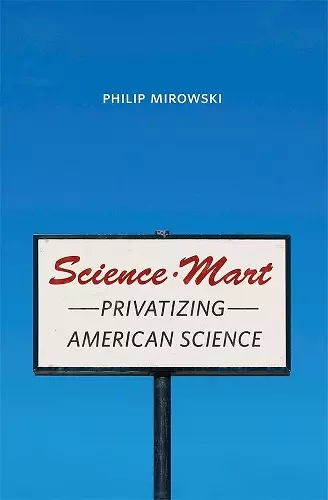Science-Mart
Privatizing American Science
Format:Hardback
Publisher:Harvard University Press
Published:1st May '11
Should be back in stock very soon

Eminently thought-provoking, this book places the contemporary economics of science in a context that combines political economy and intellectual history. A deeply impressive work that contributes to crucial debates. Mirowski never shies away from controversy and presents his case clearly and persuasively in an effective, engaging, and humorous style. -- Donald MacKenzie, author of An Engine, Not a Camera: How Financial Models Shape Markets Science-Mart is timely and important in a sense that goes beyond a specialist contribution. Mirowski's wide-ranging research addresses a dazzling array of topics, which he situates historically and fuses into a compelling critique that will fascinate any reader concerned with the economic and social dimensions of modern science and technology. -- Theodore M. Porter, author of Karl Pearson: The Scientific Life in a Statistical Age
This trenchant study analyzes the rise and decline in the quality and format of science in America since World War II. Science-Mart attributes this decline to a powerful neoliberal ideology in the 1980s which saw the fruits of scientific investigation as commodities that could be monetized, rather than as a public good.
This trenchant study analyzes the rise and decline in the quality and format of science in America since World War II.
During the Cold War, the U.S. government amply funded basic research in science and medicine. Starting in the 1980s, however, this support began to decline and for-profit corporations became the largest funders of research. Philip Mirowski argues that a powerful neoliberal ideology promoted a radically different view of knowledge and discovery: the fruits of scientific investigation are not a public good that should be freely available to all, but are commodities that could be monetized.
Consequently, patent and intellectual property laws were greatly strengthened, universities demanded patents on the discoveries of their faculty, information sharing among researchers was impeded, and the line between universities and corporations began to blur. At the same time, corporations shed their in-house research laboratories, contracting with independent firms both in the States and abroad to supply new products. Among such firms were AT&T and IBM, whose outstanding research laboratories during much of the twentieth century produced Nobel Prize–winning work in chemistry and physics, ranging from the transistor to superconductivity.
Science-Mart offers a provocative, learned, and timely critique, of interest to anyone concerned that American science—once the envy of the world—must be more than just another way to make money.
An important and intensely provocative book that explores fundamental questions about the political economy of science. Science-Mart challenges us to think more critically, more synthetically and more deeply about the growing commercialization of academic science by exploring the historical and ideological roots of that trend… Mirowski debunks the popular view that there is a linear, lockstep path leading from science and technology to economic growth, a claim that served as the mantra of those urging passage of the Bayh-Dole Act of 1980… Mirowski has shown that a political economist can bring significant new insights to the discussion of academic marketphilia. -- Sheldon Krimsky * American Scientist *
Historian and economist Mirowski presents a thoroughly researched and sure-to-be-controversial view of the economic and political influences on science policy in post-WW II America. The author traces the commoditization of science in the US—a shift from the Cold War funding by government and military entities to the present dominance of funding by for-profit corporations—making modern American science just another product in the mammoth economy. -- T. Timmons * Choice *
Eminently thought-provoking, this book places the contemporary economics of science in a context that combines political economy and intellectual history. A deeply impressive work that contributes to crucial debates. Mirowski never shies away from controversy and presents his case clearly and persuasively in an effective, engaging, and humorous style. -- Donald MacKenzie, author of An Engine, Not a Camera: How Financial Models Shape Markets
Science-Mart is timely and important in a sense that goes beyond a specialist contribution. Mirowski’s wide-ranging research addresses a dazzling array of topics, which he situates historically and fuses into a compelling critique that will fascinate any reader concerned with the economic and social dimensions of modern science and technology. -- Theodore M. Porter, author of Karl Pearson: The Scientific Life in a Statistical Age
- Nominated for Rachel Carson Prize 2012
- Nominated for Pfizer Award 2012
ISBN: 9780674046467
Dimensions: unknown
Weight: unknown
464 pages